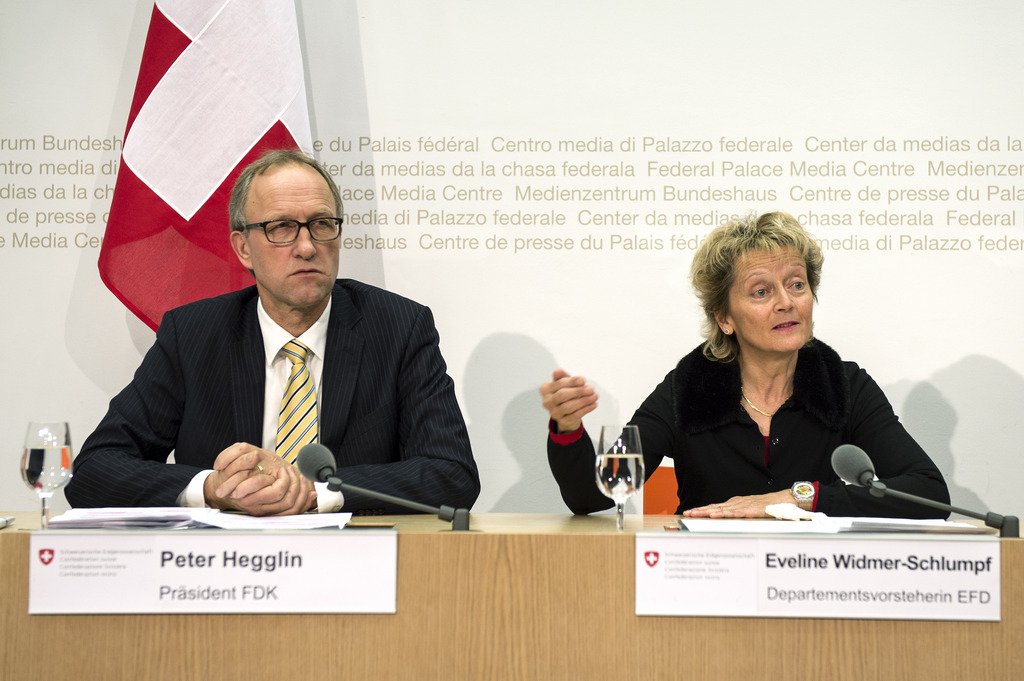Cabinet presents plans for corporate tax reform

The Swiss government wants to abolish controversial tax privileges for international firms and introduce a royalty box and an interest-adjusted profit tax.
Presenting the cabinet’s draft proposals, Finance Minister Eveline Widmer-Schlumpf said the aim of the reform is to adapt the fiscal policy to international standards, boost Switzerland’s competitive edge as an attractive business location and encourage companies to continue to make an important contribution to funding the tasks of the government, cantons and local authorities.
She acknowledged that the project, launched in 2008, is highly complex and challenging, but said it also represents a great opportunity.
“It is a chance to define a set of regulations that are accepted and create the preconditions for a competitive tax system,” she told journalists at a news conference on Monday.
Switzerland has been under pressure from the Organisation for Economic Co-operation and Development (OECD) and the European Union for the past ten years to review its preferential corporate tax policy.
About 25,000 firms – holding companies, mixed companies and management companies – are granted special tax breaks by Switzerland’s 26 cantons. The firms are either exempt from tax or subject to lower rates for the activities they engage in outside the country.
Royalty box
A key pillar of the reform is the introduction of so-called royalty boxes – a method of preferential tax treatment for certain types of profits, notably royalties from a patent.
The OECD is due to define the legality of royalty boxes by the end of next year amid calls to abolish their use.
But Widmer-Schlumpf is confident that the practice will not be scrapped as Britain, Luxembourg and Belgium are defending their corporate fiscal regimes.
“The question is not whether royalty boxes will continue to exist or not. The question is how they will be defined. Switzerland might have to adapt its law accordingly,” she said.
Adrian Hug of the Federal Tax Authorities hinted that Switzerland could maintain its corporate tax system for a while if the international community needs more time to find a consensus.
Widmer-Schlumpf maintained that Switzerland has to act now to give investors the necessary legal security.
“Many international companies would leave Switzerland,” she warned.
The planned reformExternal link is expected to lead to a shortfall in revenue to the tune of CHF1.7 billion ($1.8 billion) annually for the federal authorities. The finance ministry plans to offset the costs without spending cuts but by introducing a capital gains tax on securities. It also suggests increasing the number of federal tax inspectors from about 300 to about 370.
The overhaul of corporate taxes also has a major impact on the fiscal rates of the country’s largely autonomous 26 cantons and on the system of financial payments between rich and less affluent cantons.
Reaction
Cantons, political parties and other organisations now have until the end of next January to respond to the white paper as part of a regular consultation process.
Widmer-Schlumpf says the cabinet will present a bill to parliament next summer. She hopes a first reading of the amended law will be tabled within 12 months.
In a first reaction, the Swiss Business Federation welcomed the government proposal as an important signal for a strong business location and continuing legal security.
In its statement, the Trade Union Federation criticised a proposed reduction in taxes for employers and shareholders.
For the centre-right Radical Party it is crucial to limit the planned reform to a minimum and prevent a mass exodus of international companies from Switzerland.
The centre-left Social Democrats are more positive about the reform. They praise it as an attempt to tackle what they consider unjustified tax privileges, but warn that revenue from a planned capital gains tax might not be sufficient to cover other shortfalls.
For its part, the rightwing Swiss People’s Party says the reform is premature, as the international community has not yet agreed the terms of a tax regime to prevent companies from shifting their taxable profits from the place of actual business activity to other locations with more favourable tax rules.

In compliance with the JTI standards
More: SWI swissinfo.ch certified by the Journalism Trust Initiative







You can find an overview of ongoing debates with our journalists here . Please join us!
If you want to start a conversation about a topic raised in this article or want to report factual errors, email us at english@swissinfo.ch.